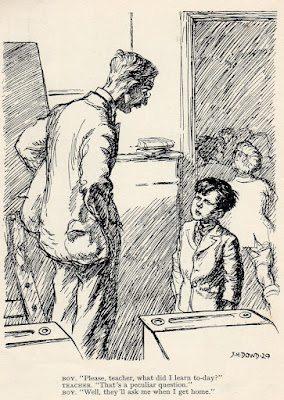New Year's Eve 2010, and I would just wish everybody the very best for 2011 and hope you all have a healthy and happy time throughout the coming year. Frank Reynolds (1876-1953) cartoon of the early 1920's depicts the 'problem' of returning the seasonal compliment with an original turn of phrase.
Transcript below:
PUPIL: "A Happy New Year to you, Sir."
TUTOR: (who has a horror of the phrase. "The Same to You") "Thank you, Smith; and I sincerely trust that the ensuing twelve months will be fraught with unbounded joy for you also."
* * * * *
In the time honoured tradition of the New Year Sales, for this post only, we have a 'two for the price of one' edition. Attached below is a topical cartoon from the pen of A. Wallis Mills (1878-1940) to help bring us into the New Year with a smile.
Transcript below:
WIFE: "I'm writing a paper on Calendar Reform for our Club. Do you know which Pope it was that gave us our present calendar ?
HUSBAND: "Pope?" Good gracious! I thought it always came from the grocer."
HUSBAND: "Pope?" Good gracious! I thought it always came from the grocer."





































